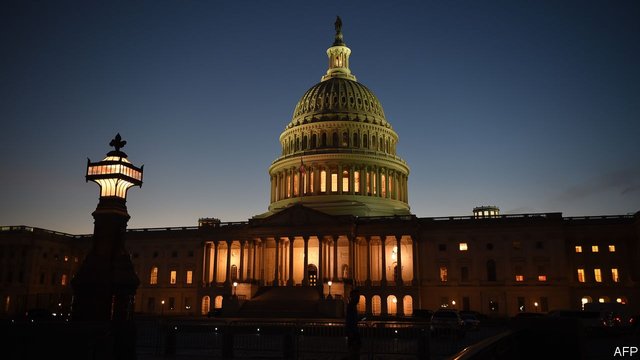America’s Congress agrees on a long-overdue stimulus compromise

THE DEBATE over America’s second big round of fiscal stimulus to ameliorate the economic fallout from covid-19 began seven months ago. In May Democrats passed a bill containing their opening bid through the House of Representatives—a gargantuan $3.4trn package. Negotiations with the Republican-controlled Senate and the Trump administration have been stuck since then. They remained stuck as a second wave of infections crested in the summer, as support for unemployment benefits in the first package (called the CARES Act) expired in August, and even as Americans voted for a president while a third, winter wave began to build.
Now a hasty, last-ditch deal has broken the logjam: on December 20th Congressional leaders from both parties announced a compromise package thought to cost $900bn. The deal was hurried through both houses the next day, combined with a $1.4trn package to fund the federal government until the end of September. Lawmakers will have had little chance to read much of the hastily assembled 5,600-page text. President Donald Trump is expected to sign it into law.
Relative to both Democratic ambitions and the original provisions of the CARES Act, the compromise is a modest affair. The federal top-up for unemployment benefits will be $300 per week (compared with $600 before), and will last for only 11 weeks. Americans will be sent a second lot of direct cheques, also half as big as the first ($600 per person, as opposed to $1,200). Another $284bn will be allocated for the Payment Protection Program to provide struggling firms with forgivable loans. One month before the election, Nancy Pelosi, the Democratic Speaker of the House, turned down a much more generous deal, costing $1.8trn, on the grounds that it was too puny. That decision looks questionable now, except on tactical grounds: it denied Mr Trump a legislative victory shortly before the election that he narrowly lost.
Far from ending the agonising, samsaric cycle of stimulus negotiations, the deal means that they can begin anew. “Unfortunately the troubles are so deep, and the abyss is so, so, so long, that we need more, and this is just a first step,” said Chuck Schumer, the Democratic leader in the Senate, at a press conference. “We need a second bill to continue dealing with the emergency.” Deciding the contours of that subsequent bill will probably dominate the opening days of Joe Biden’s presidency. The Democratic president-elect praised the pending legislation as “an important down payment on the investment we need in vaccine procurement and distribution” in a statement, but also cautioned that “this action in the lame-duck session is just the beginning”. Mr Biden has set an ambitious goal of seeing 100m vaccine shots administered in his first 100 days (fewer than 1m have been given so far).
The relief, temporary as it is, is arriving just in time. Though most unemployment benefits provided by the CARES Act expired in August, 12m Americans have been receiving cash through smaller programmes (eg, a special pot for gig workers) that expire on December 26th. A moratorium on evictions that would have run out at the end of the year will be reinstated. The first stimulus programme dented poverty significantly; the number of Americans below the federal poverty line (the estimated income needed to cover basic necessities) has risen by 25% in the past five months, the fastest rate of increase in decades. Other measures of extreme hardship, such as inability to pay for food and housing, have shown similar disturbing increases over the past few months. The education of most American children is still disrupted, and learning losses are already being detectably measured. The compromise would send billions to modify schools’ ventilation systems, to facilitate a return to in-person teaching.
As the incoming president, Mr Biden will benefit from the economic recovery that should follow mass vaccination. But the intervening months will be trying. The extra benefits begin to taper off in March. How much leverage he has by then will depend greatly on the outcome of the run-offs for Georgia’s two Senate seats on January 5th, which will determine which party controls the chamber.
All the while, the cost in health and lives continues to climb. Covid-19 is spreading rapidly: more than 200,000 infections are being reported daily, and on some days the death toll exceeds 3,000. There is little reason to think that it will go into reverse before vaccination is widespread. Already, 318,000 Americans have died. At the rate of the past week, another 80,000 will do so before Mr Biden takes his oath of office on January 20th. Mr Trump, meanwhile, is focused on increasingly erratic schemes to overturn his election defeat.
https://www.comentr.com/t/gaming/cciA https://www.comentr.com/t/gaming/cciC https://www.comentr.com/t/gaming/cciE https://www.comentr.com/t/gaming/cciF
https://offertabs.s3.amazonaws.com/offer/z5bu8e/uploads/5fe32b4dd3374-Vixt4-Vbucks-Codes-Generator-9721.pdf
https://offertabs.s3.amazonaws.com/offer/z5bu8e/uploads/5fe32b76b8701-Vixt4-TikTok-Followers-2514.pdf
https://law.unlv.edu/sites/default/files/webform/pif/Disney-Plus-Account-DipaN.pdf
https://law.unlv.edu/sites/default/files/webform/pif/Pixt7-31742341.pdf